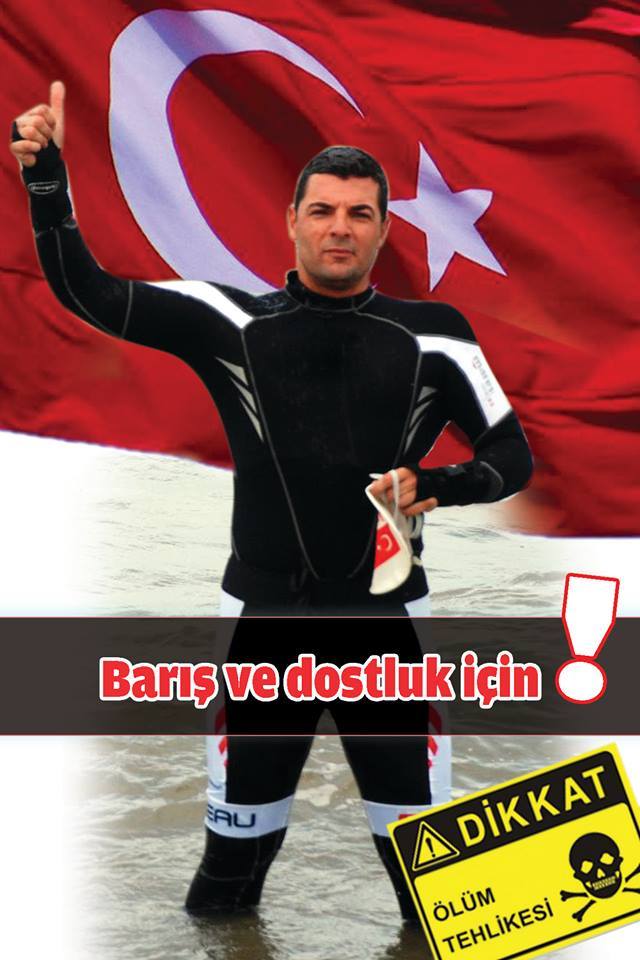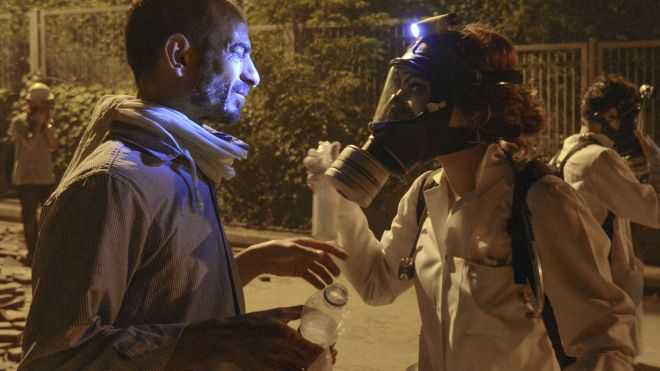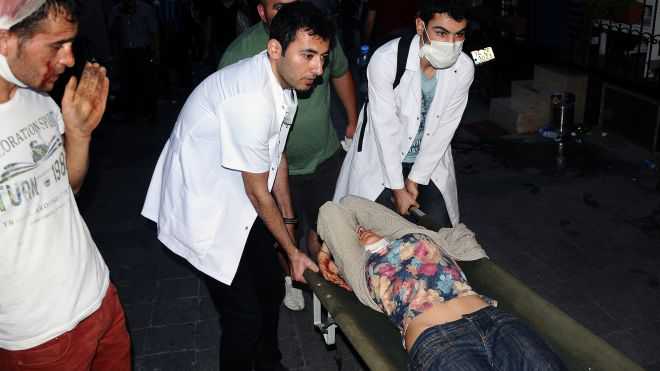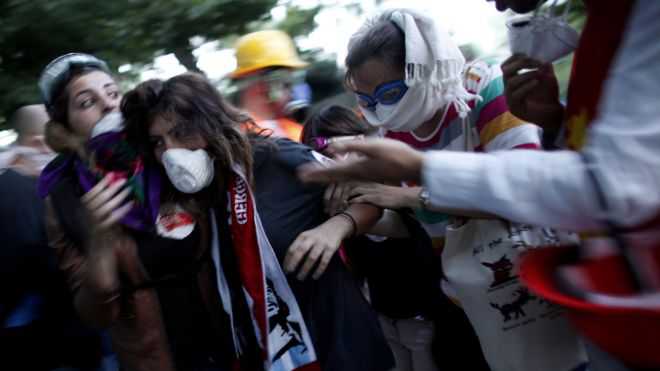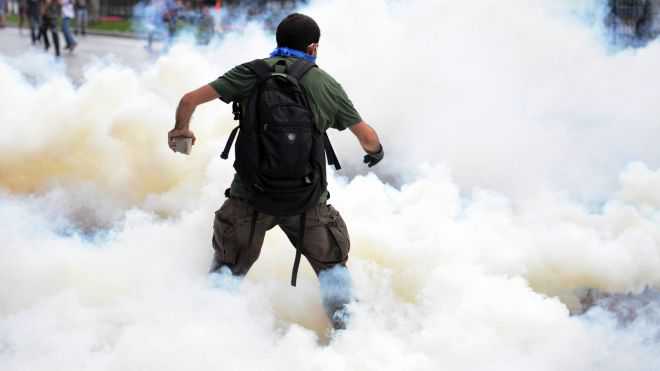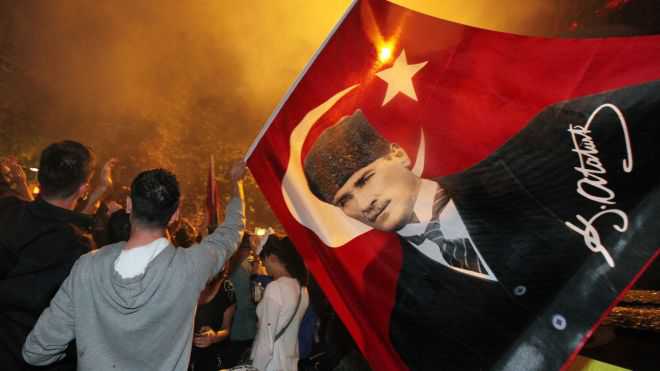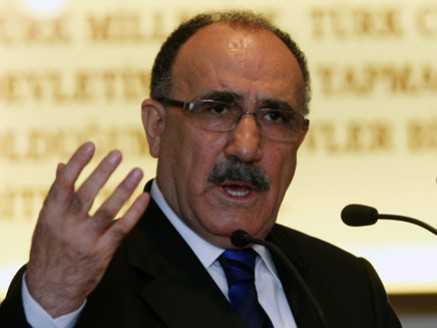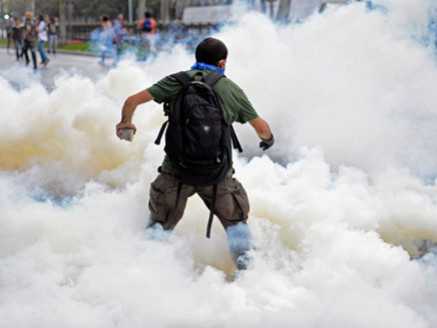Posted on 07/11/2013 by Juan Cole
Vernon Schubel writes at ISLAMiCommentary:
On May 31st of this year a protest over the fate of Gezi Park, located near Istanbul’s famous Taksim Square, evolved into a series of broad-based demonstrations against the government of Prime Minister Recep Tayyip Erdoğan and his Justice and Development Party (AKP).
Over the next month protests continued throughout Turkey. Thousands were injured and at least four died. Serious incidents of police violence were documented, and people were detained and interrogated. Smaller protests continue to take place even now and popular opposition to the AKP is more visible than ever before.
Erdoğan responded to last month’s protests by organizing massive counter rallies of his own. In his speeches at these rallies and in subsequent weeks the Prime Minister’s provocative language about terrorism, Kurds, the Alevi minority, and the need to control the press and social media have reinforced real concerns among many Turks that their country — ruled by the AKP — is turning away from democracy and becoming increasingly authoritarian.
What began as a protest about whether to bulldoze and commercialize Gezi Park has transformed into a new social and political movement against authoritarianism that may ultimately transform the country. And, in the wake of successful protests against the Muslim Botherhood in Egypt, what impact, if any, does that outcome have on the future of Erdoğan and the AKP?
From the outset the nature and the meaning of the protests in Turkey have been contested. Among American scholars and policy makers are some who see this as the beginning of a “Turkish Spring” analogous to previous events in Egypt and Tunisia.
Taksim Square in Istanbul filled with protestors (June 9, 2013). photo courtesy of showdiscontent.com
Others, meanwhile, have been quick to argue that “Taksim is not Tahrir” as Erdoğan unlike Mubarak is an elected leader. Could that logic shift now that an elected leader – Egyptian President Mohammad Morsi – has been overthrown by protestors with the assistance of the military? I will come to that later, in the conclusion of this essay.
Some have argued that the “Turkish Spring” actually began with the election of the AKP government, which has worked to end the Kemalist “Deep State”— the shadowy group of military leaders, non-elected bureaucrats and other elites believed by many to be in actual control of the Turkish state — and given voice to the democratic aspirations of the Muslim majority. This attitude of support for the AKP government should not be surprising. Among American academics and policy makers there is an influential contingent who have held up Erdoğan’s government as a model for “Islamic democracy” in the rest of the Muslim world.
Many of those same scholars have similarly been touting the transnational religious movement associated with Fetullah Gülen — a powerful cemaat (religious community) that has been a significant proponent of the AKP — as a model for Islamic reform, and which has worked hard over the last decades to build and sustain professional and institutional relationships with American academics.
Recent events in Turkey provide an opportunity to re-examine some of the assumptions that underlie the support for the AKP and Gülen movement that one finds among many American scholars and policy makers.
“Kemalist Secularism” vs. Islam
Recep Tayyip Erdoğan. photo courtesy Wikimedia Commons
The overly simplistic binary of “Kemalist secularism vs. religion,” has been frequently used by scholars, experts, and the media — as well as by Erdoğan, the AKP and the Gülen movement — to explain the divisions between protestors against the regime and Erdoğan’s supporters.
Supporters of the AKP and the Gülen movement frequently portray “the Kemalists” as totalitarians who’ve attempted to eradicate religion. For them the most significant aspect of modern Turkish history has been the state’s hostility towards religion. Hence, they see the AKP’s electoral victory as the defeat of “the Kemalist minority” who kept a Sunni Muslim majority from freely expressing their identity.
This is, of course, a deeply selective reading of Turkish history.
While it is true that some members of religious cemaats suffered from persecution during periods of Kemalist authoritarianism, they certainly were not the only ones. In fact, leftists, Alevis, Kurdish activists, and trade unionists were much more likely to have been targeted and jailed by the state over the last century.
Furthermore, while the AKP and the Gülen movement claim to speak for a long persecuted religious majority in Turkey, in reality the movement itself represents a narrow brand of modernist Islam that links together a shari’ah-minded version of Sunni piety with neo-liberal economics and Turkish nationalism.
While they are extremely well-organized and powerful, they are far from a majority. In terms of religion Turkey is in reality deeply pluralist. While the majority of the population may identify as Sunni Muslims a significant minority, somewhere between 15 and 30 percent, identify as Alevi. And in both the Alevi and Sunni communities there is a wide range of ways in which people manifest their religious identities. Beyond this there are important communities of Christians, Jews, and Arab Alawis. And there is also a relatively small portion of the population that rejects religion entirely. It is hard to see the kind of Sunni piety associated with the Gülen movement, and the religious base of the AKP, as representing a majority of the Turkish population.
Nevertheless, the AKP has tried to argue that the recent protests are rooted in a combination of anti-Muslim animus and a longing for a return to the “Kemalist past.” For example, Erdoğan has claimed that protestors in Istanbul drank alcohol in a nearby mosque despite the fact that the muezzin of the mosque in question has denied these incidents took place even after hours of interrogation by government officials.
In fact, observers noted that protestors took special care not to violate the sanctity of the commemoration of the event of the Prophet’s night journey to paradise (mirac), which coincided with one of the early days of the protests.
Most of the protestors, in fact, likely identify themselves as Muslim. Notable is the fact that among the participants were explicitly religious Muslim groups critical of the neo-liberal capitalism of the AKP.
While many of the protestors have been critical of what they see as the AKP’s desire to force its own vision of Islam on the rest of the populace, these protests have been mainly about authoritarianism, not religion.
Diversity, Anti-Authoritarianism and Pots & Pans
In actuality, there seems to be no nostalgia for “Kemalist authoritarianism” among the protest movement in Turkey. First and foremost – and especially important to note — unlike in Egypt there has been no call for a coup among the protestors.
While in general, the protest movement seems to be opposed to authoritarianism in any form, they are calling for a more inclusive and less authoritarian view of the Turkish Republic. In that respect they mirror the perspective of the popular band Kardeş Türküler, who produced a fascinating song and video in support of the Gezi protests called Tencere Tava Havasi (The Sound of Pots and Pans). This referred to the simple act of opposition to the AKP; people went out to their balconies and banged on pots and pans at specific times. This form of protest has spread throughout Turkey in the wake of Gezi Park.
Kardeş Türküler is a group that embraces the ethnic and religious diversity of the entirety of Turkey. They perform songs not only ın Turkish but also Kurdish, Arabic, Armenian and Laz. And while Kardeş Türküler are extremely popular with young people, especially college students, they are not unique in the thriving Turkish folk music scene in their embrace of pluralism and diversity.
They are representative of the worldview of a large subculture of young people in Turkey who accept their country’s diversity. These young people embrace Alevi and Kurdish culture, even if they are not Alevi or Kurdish. They support democracy as a means of protecting pluralism. Their issues are far from marginal and are instead indicative of concerns that have long been part of the Turkish cultural and political scene. Rather than a longing for a return to ‘Kemalism,’ the protests represent an important emerging new social movement built around an antipathy towards authoritarianism and an acceptance of pluralism and diversity.
Demonizing Atatürk and the Kemalists
Mustafa Kemal Atatürk. photo courtesy the Republic of Turkey Ministry of National Education (Wikimedia Commons)
In contrast, the AKP continues to refer to an “us vs. them” paradigm. For them the protests represent the last gasp of the Kemalists or “enemies of the people.” Early on in the protests Erdoğan responded to critics of new laws limiting alcohol sales by referring to the founder of the modern Turkish Republic, Mustafa Kemal Atatürk dismissively as “a drunk.”
This drew immediate and widespread critıcism. Despite their faults, Atatürk and the Republican state had their share of accomplishments, which benefited large segments of the population. First of all, in the chaotic years following World War I and the collapse of the Ottoman Empire, Atatürk (at least in the minds of many people) kept Anatolia from being colonized —which at the time was a real possibility.
In fact Turkey was the only Muslim country in the region to not be carved up and governed by foreigners. Secondly, the democratization of education led to the development of a true middle class in Turkey. Anyone who spends time in Turkey knows people whose grandparents, or even parents, were illiterate or part of the peasantry but who are now lawyers, doctors, teachers and professors.
Yes, the system is far from perfect and nowadays it is difficult to do well on the university exams, for example, without taking special private classes. But Turkey’s success in producing not only a prosperous and educated middle class is in large part due to transformations made by Atatürk and the Republicans, and that is a historical fact accepted by most Turks.
Criticism of the past is one thing, but the AKP and the Gülen movement have shifted from criticism to a kind of demonization of post-Ottoman Turkey as a totally undemocratic totalitarian anti-religious state. Yes, it might have been authoritarian. Yes, it at times persecuted its critics — but not only its religious critics. Yes, the military intervened with coups. But many people benefited from the reforms brought about in the Republican period, and the AKP risks alienating a significant percentage of the population by demonizing their shared Turkish past.
The AKP: Democracy or a New Deep State?
It can also be argued that part of the support that the AKP has garnered electorally has come not from its support of Sunni Muslims or its critique of Kemalism but rather from its advocacy of democracy. The AKP has vigorously sought to limit the power of the military so that there can never again be another coup. In general it has had the support of the people ın doing so.
Now, however, many people in Turkey fear that the AKP and the Gülen movement — rather than being forces for democratization — are in fact creating their own version of “the Deep State.”
The rise of the AKP and the Gülen cemaat is indeed frightening to many Turks. In 2011 the renowned journalist Ahmet Şık was arrested for writing a book that argued that the Gülen movement was taking over organs of the state, especially the police. His book was banned before it was even published.
Not only is there obvious press censorship and harassment of journalists, but ties between the AKP government and corporate media have also resulted in massive media censorship. It is common (and embarrassing) knowledge in Turkey that while CNN International was covering the protests, CNN Türk showed a documentary on penguins. The popular history journal connected to the news network, NTV, (NTV Tarih) was recently shut down by its administrators before it could put out an issue dedicated to the Gezi protests.
Television networks that covered the protests have suffered harassment, and there have been calls to control social media. Although police violence was obvious during the protests,Erdoğan, who initially apologized for the “excessive violence that was used in the first instance against those who were behaving with respect for the environment,” has since been effusive in his praise for “his police” and their response to the protestors whom he has equated with “terrorists.”
There are many in Turkey afraid of ultimately losing the very real benefits that they received from the successes of the last century, and being forced to conform to a new authoritarian ideology — rooted in a Weberian understanding of the connection between religious puritanism and capitalism, the religion of Islam and Turkish exceptionalism.
Parting Thoughts
It should be noted that since I wrote the initial draft of this essay a reboot of the protest movement of 2011 in Egypt has occurred – this time in opposition to the democratically elected government of the Muslim Brotherhood. This group had a grievance similar to the Gezi Park protestors — that the elected government was ignoring the rights and desires of the 50% of the population that did not support them, and was becoming increasingly authoritarian. That government was subsequently overthrown with the assistance of the military.
That is clearly not going to happen in Turkey. But it is clear that Turkey is increasingly polarized politically. Erdoğan and the AKP have a substantial base of support that will not easily erode. And yet there are cracks appearing in the conservative coalition that supports the AKP.
Women protesters in Taksim Square, Istanbul (June 1, 2013) photo courtesy of showdiscontent.com
Some of Erdoğan’s more over-the-top statements, such as equating protestors with terrorists, have frankly been embarrassing to many supporters of the AKP especially among some in the Gülen movement. At the same time there are new coalitions arising in opposition to the AKP. It is fascinating to see Alevis, environmentalists, anti-capitalist Muslims, women’s rights advocates, LGBT activists and others making common cause against what they see as the growing authoritarianism of the current government.
… I began this essay by noting how some American scholars and policy makers have tended to be supportive of the AKP and the Gülen movement. I think that many of them do this because they see this as a struggle between Islam and secularism, and they wish to be on the side of the Muslim majority. I also think that many of them hold to an Orientalist belief that Muslim majority countries cannot aspire to democracy but instead to some form of “Islamic democracy.” They thus see Erdoğan and Gülen as the best alternatives to more extremist forms of Islamism. I think they have an overly essentialist view of Islam that leads them to an overly narrow view of the possibilities open to Muslims.
Certainly I would not write-off either the Muslim Brotherhood or the AKP as totalitarian movements. But they do represent forms of conservative majoritarianism. At the most they may be willing to tolerate pluralism to a limited degree, but they certainly do not embrace or celebrate it. The social movement arising out of the Gezi protests is not about secularism vs. Islam. It is more accurately about pluralism vs. majoritarian-ism.
Unlike Egypt there is virtually no possibility that the current regime will be removed by a coup. But the upcoming electoral struggle will be fascinating to observe. Like the Muslim Brotherhood in Egypt, the AKP and the religious communities that support them have the advantage when it comes to organization.
The Gezi protests have mobilized an opposition to the AKP that was previously both intimidated and discouraged, and a month and a half later that opposition is still active and vital. But there is as yet no single political party who seems to speak for the concerns of this opposition, and the question remains whether this movement will translate into votes that will change the government. (Parliamentary elections, unless Erdoğan moves up the date, are scheduled for 2015 )
Eboo Patel has said that the real struggle in the 21st Century is between pluralism and totalitarianism. This may be a bit stark, but I understand his point. It seems clear that the real conflict in Turkey, Egypt, and, in fact, in many parts of the world is between those who embrace pluralism and see it as something for which we should strive, and those who are troubled by it and believe that the religious and cultural sensibilities of the majority should, at the very least, be privileged.
Vernon James Schubel is Professor and Chair of Religious Studies and Director, Islamic Civilization and Cultures at Kenyon College in Ohio. In addition to Religion 101 he teaches a variety of courses on Islam, including Classical Islam, Voices of Contemporary Islam, and Sufism; and Religions of South Asia. His has conducted field work on Islam both in Central and South Asia. His current research focuses on the Turkish Alevi tradition. His book, Religious Performance in Contemporary Islam, was published by the University of South Carolina Press in 1993.
——
Mirrored from IslamiCommentary
0Retweet 1 Share 1 Google +1 0StumbleUpon 0Printer FriendlySend via email
Posted in Turkey | Leave a Comment | Print


